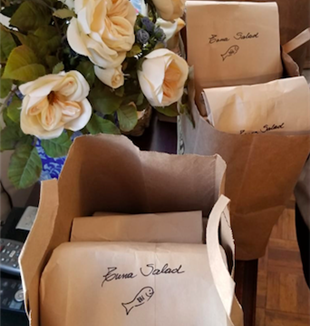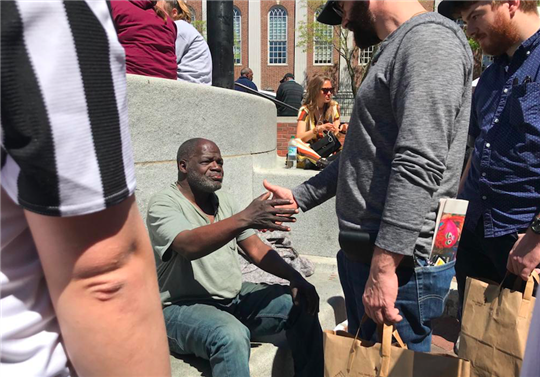
What Does it Mean to Serve?
A group of friends from Boston, prompted by a friend's beautiful experience in Seattle, start their own charitable work. Here is what they discovered.On May 2, during our School of Community, Elisa mentioned that in April she spent a weekend with the Seattle community and had the opportunity to partake in their charitable work, which consisted in preparing lunch for and eating with the homeless.
Later, over dinner, Michael expressed interest in joining her, saying that over the past year he had the desire to cook for homeless people and, as a cook, the question in the forefront of his mind has been, “What does it mean to serve?” “One of my biggest desires is to cook an amazing meal for those that cannot pay for it,” he said. “Thinking about the homeless, I want these people to taste the best sandwich they have ever had in their life.”
During that dinner we decided to start a charitable work. We initially thought to not invite anyone for the first time, since we weren’t quite sure what to expect from it. During the following School of Community, however, we mentioned this idea without explicitly inviting the others, but Alpha asked several times if she could join us and if we could prepare the food at her home. Later on, she told us that upon hearing the proposal she had a natural impulse to say yes. “When I ask myself what makes me act on this impulse to ‘be with’ others and to ‘be for’ others, I think of obedience,” she explained. “I am called, and I am saying ‘yes’ to that bidding.”
Michael also invited David, Alpha’s son, who accepted the invitation not due to a feeling of obligation toward a task of the Movement, but because his friends that were living in an attractive way would have been there as well. “For me it was a possibility to be reminded of what is at the origin of our friendship, even if we don’t see each other for a long time,” he said. “It was also an occasion to re-discover, the day before the Mother’s Day, what binds me and my mom, other than the fact we are mother and son.”
On Saturday morning, we met at Alpha’s place. There were also two other friends, not in the Movement, who most of us had never met before. Michael arrived with the food: he had bread, tuna salad and chicken salad, chips, vegetables, dessert, and napkins. Everything was thoughtfully bought to be of very high quality; even the wrappers were beautiful. Rather than buying soda, Alpha bought San Pellegrino sparkling water, mindful to serve it cold. We said a prayer and we read The Meaning of Charitable Work together, and we had Ernesto—who has the best handwriting out of all of us—label the sandwich bags with beautiful calligraphy. Ernesto was responsible for registering baptisms and weddings for a parish he was working for, and maintaining a good calligraphy was essential. We discovered something new about him, and even this skill was used to serve. In the preparation, each one of us had a task, and people were continuously paying attention to the others to see if anyone needed help.
When we finished preparing lunch, we had twenty-eight packed lunches. We went to Harvard Square and we met many people, but we will share the most meaningful stories.
Alastair was the first homeless man we met; he was playing the ukulele. After we each shook Alastair’s hand, he smiled. He was covered in tattoos because, as he told us, he wants “to be unique, like nobody else.” He then started to ask insistently, multiple times, who we were and whether we were from the Church. After we told him a bit more about us, we asked him if we could play something for him with his ukulele. Mattia, in fact, had suggested we bring a guitar to Harvard Square because playing and singing is what we do best, but we ended up not bringing one because we wanted to keep things simple. We sang “Let it Be,” and Alastair was moved, and, blushing, he started to sing with us passionately: he was all in it. Three girls even stopped by us to sing along. Something so beautiful was happening that was truly for everybody.
Then we met Marcel. When we handed him a sandwich, Ernesto told him that it was special and, when asked why, he replied that it was made with love. “Right answer,” said Marcel. “Loving is the most important thing.” We stopped and had lunch with him, and he told us about his life and how both good and bad events contributed to bring him where he was. “Every day I wake up and I’m happy, because I survived the night--I already won my battle.” It was clear to us that he was not perceiving himself defined by his condition. When we left him, Mattia said, “I was struck by how he looked at me. He really wanted to be our friend and treated us as equals.”
At the end of the day it was clear to all of us that we had given time and money to the homeless, but most of all we had shared our friendship, and they had become part of it.
After that experience, Michael shared that usually he does not care about the food he makes for himself and ends up cooking something quick and random. However, after committing to this charitable work, every night he tried different tuna salad recipes in order to come up with the best one. He concluded that what Giussani writes in The Meaning of Charitable Work is really true: making something beautiful for others is part of us.
David was struck, more so than even being there for the homeless, by the fact that people were really paying attention to him. He said, “What we lived was a true friendship, not only a thing to do because the Movement proposes it.”
Alpha said that charitable work and this friendship sparked in her the desire to be true to who she is. “I have no way of judging what the people who 'benefit' from my participation in charitable work need,” she explained. “It is not a matter of feeding the hungry or consoling the lonely. I do it for myself, to fulfill my desire to be myself. Charitable work for me is an expression of my gratuitousness. It is a recognition that everything I have is given to me by the Father, including time, talent, health, energy, people, and material possessions.”
Mattia shared that as soon as he returned home his first desire was to go to mass because he wanted to pray that what we lived could be forever. “I wanted to totally give my life to Christ,” he said. “I went back home, and I noticed that I was loving my wife so much. … Like a flash, I thought about John and Andrew after their encounter with Jesus. The dynamic was the same. I was with her, but everything I had lived that morning was with me as well.” Mattia also said that in the days that followed, he experienced the loneliness that Jesus must have felt during his public life. When trying to explain his experience of charitable work to others, they reduced it to volunteering or solving homeless hunger. “They didn’t understand what happened,” he said. “I do charitable work to discover who I am.”
Now, we could ask ourselves, how do we sustain this initiative? However, it is clear, thanks to the School of Community and the Exercises, that we don’t sustain it. In Morality: Memory and Desire, Giussani writes that the encounter with Christ creates a new humanity that makes a community a source of initiatives. However, a new change cannot merely spring from moralism, but it must come from an “Other” radically different from us. “The world and society change through human realities that have already been changed,” Giussani says.
And this is indeed what happened. Michael had always tried to kickstart an initiative, but our charitable work happened when Elisa, changed by her experience in Seattle, shared it with us. And Elisa changed because the human reality in Seattle was renewed. It’s a chain of encounters. So, as we heard in the Exercises, the only thing that can withstand the test of time is His contemporary Presence that we can recognize.
Michael, Mattia, Ernesto, Alpha, David, and Elisa, Boston, USA